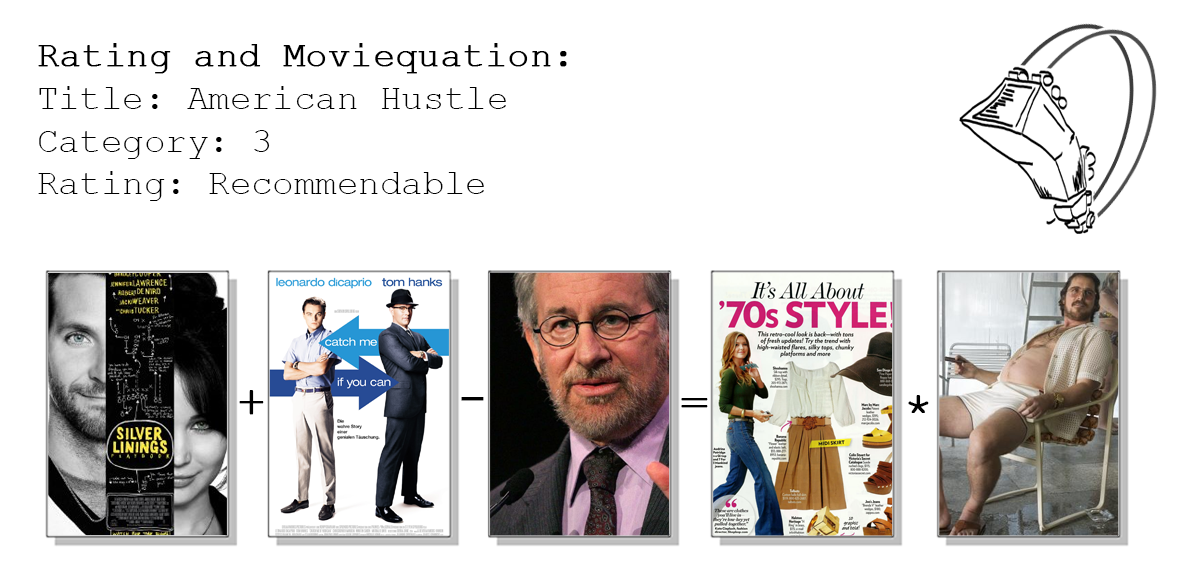If a note at the beginning of the movie reads
“some of this actually happened”
you pretty much know what you are going to get. American Hustle is loosely based on true events but the historical accuracy is never in the foreground. David O. Russell’s (The Fighter, Silver Linings Playbook) newest movie once again has garnered an incredible amount of Oscar buzz (incredible 10 nominations).
Starring Christian Bale and Amy Adams as the two con artists Irving Rosenfeld and Sydney Prosser the director once again skillfully brings out the best of his actors and delivers a much more layered movie than last year’s Silver Linings Playbook. This is probably due to the double crossing nature of the characters which leaves the audience questioning who is playing which game and why.

Who is the honest one?
Irving and Sydney are the perfect couple. They fully embrace the fact that they are messing with people’s expectations when they betray them for their money. Dressing up and pretending to be someone else to lure in gullable customers is their bread and butter. But it doesn’t take long for the FBI to get after them and when faced with a sentence the two survivalists are talked into exposing corrupt officials instead – bullshitting for a good cause so to speak. Yet agent Richie DiMaso (Bradley Cooper) is anything but an upright person. Much like the characters in Russell’s previous films no one is completely flawless – especially not those who are on paper the “good guys”.
And so tricks are piled onto tricks, wigs and revealing dresses are put on, couples break up, new love is found, allegiances are challenged – but what is the truth behind all this?
Aren’t we all bullshitting to survive?
Similarly to Silver Linings Playbook this movie has one clear theme that it keeps developing and exploring over its running time. And this is the edge American Hustle has over last year’s outing: the theme of lying to the world and eventually yourself leads to much more complex questions.
Whereas in Silver Linings Playbook the central idea of “aren’t we all a bit crazy” felt a bit too stretched out yet worked because it was carried by the charismatic performances, Hustle has the advantage that we are never sure about the truth behind the make-up. And even if some characters turn out to be not that complex after all it is the charm of the movie that sometimes the audience expects more from these tricksters.
Are their motivations so simple? Or are they playing a larger game?
This leads to a lot of fun guessing thorough the movie which is standing on solid ground. Especially the third act just keeps going with the crossing and doublecrossing. There hasn’t been that much betrayal within betrayal since the first Pirates of the Caribbean movie – although American Hustle is much more consistent within its narrative and characters.
The Cookie-cutter ending
David O. Russell’s movies are often revolving around heavily damaged characters but characters the director clearly loves. And if you love somebody, you naturally wish the best for him. And American Hustle is no exception. Watching the movie about 7 hours after 12 Years a Slave highlighted the differences even more. Because at the end of American Hustle everything is neatly wrapped up to the point where one has to ask why the characters can even come to this conclusion since for almost the entire movie they have done the complete opposite. The question how a character can change that much that quickly is left unanswered but to me it wasn’t that big of a deal.
Verdict
American Hustle was the nice lightweight movie that serves as a perfect counterbalance to the grim and serious 12 Years a Slave. The latter is probably the more important movie, one of those greatest movies of all time… that I never want to see again.
American Hustle on the other hand is – much like Silver Linings Playbook – one of those pleasant and extremely entertaining movies. While it is still not as powerful as The Fighter I was pleasingly entertained with this newest outing by David O. Russell.




Schreibe den ersten Kommentar